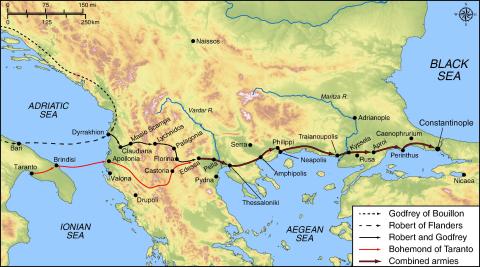Bohemond's March to Constantinople
[2.5.1] Mandāvit īnfēlīx imperātor, simul cum nostrīs nūntiīs, ūnī ex suīs quem valdē dīligēbat, quem et cōrpalātium vocant, ut nōs sēcūrē dēdūceret per terram suam, dōnec venīrēmus Cōnstantīnopolim. Cumque trānsīrēmus ante illōrum cīvitātēs, iubēbat habitātōribus terrae ut nōbīs asportārent mercātum, sīcut faciēbant et illī quōs dīximus. Certē tantum timēbant fortissimam gentem domnī Boamundī, ut nūllum nostrōrum sinerent intrāre mūrōs cīvitātum. Voluēruntque nostrī quoddam castrum aggredī et apprehendere, eō quod erat plēnum omnibus bonīs. Sed vir prūdēns Boamundus nōluit cōnsentīre, tantum prō iūstitiā terrae quantum prō fīdūciā imperātōris. Unde valdē īrātus est cum Tancredō et aliīs omnibus. Hōc factum est vespere. Māne vērō factō, exiērunt habitātōrēs castrī, et cum prōcessiōne dēferentēs in manibus crucēs, vēnērunt in praesentiam Boamundī. Ipse vērō gaudēns recēpit eōs, et cum laetitiā abīre permīsit illōs.
notes
(February 1097) Alexius sends a high official to escort Bohemond’s men and ensure they are well provided for. Many of Bohemond’s followers, including Tancred, hope to capture a particularly rich town, but Bohemond, intent on keeping the peace, forbids them.
īnfēlīx imperātor: The Byzantine emperor, Alexius I Comnenus. Our author is distinctly hostile to him.
cōrpalātium: "kyropalatēs," an important Byzantine court official.
dōnec venīrēmus Cōnstantīnopolim: "until we should arrive at Constantinople."
sīcut faciēbant et illī quōs dīximus: "as those whom we spoke of used to do"; these were presumably the inhabitants who supplied the Franks when they first crossed the Adriatic (1.4.3).
prō iūstitiā terrae: i.e., he wanted to treat the territory fairly.
īrātus est cum Tancredō et aliīs omnibus: Bohemond was angry with them for wanting to capture the town.
Māne vērō factō: “But in the morning., etc” Mane facto is an ablative absolute. CL would say simply mane (adv.) but mane can also be an indeclinable neuter noun.
vocabulary
infēlīx –īcis: unlucky (CL), wretched (ML)
corpalatium: curopalates (a Byzantine official)
apprehendō apprehendere apprehendī apprehensum: to sieze, gain possession of (OLD 2)
eō quod: because
unde: from what place, whence (CL); for which reason” (ML)

